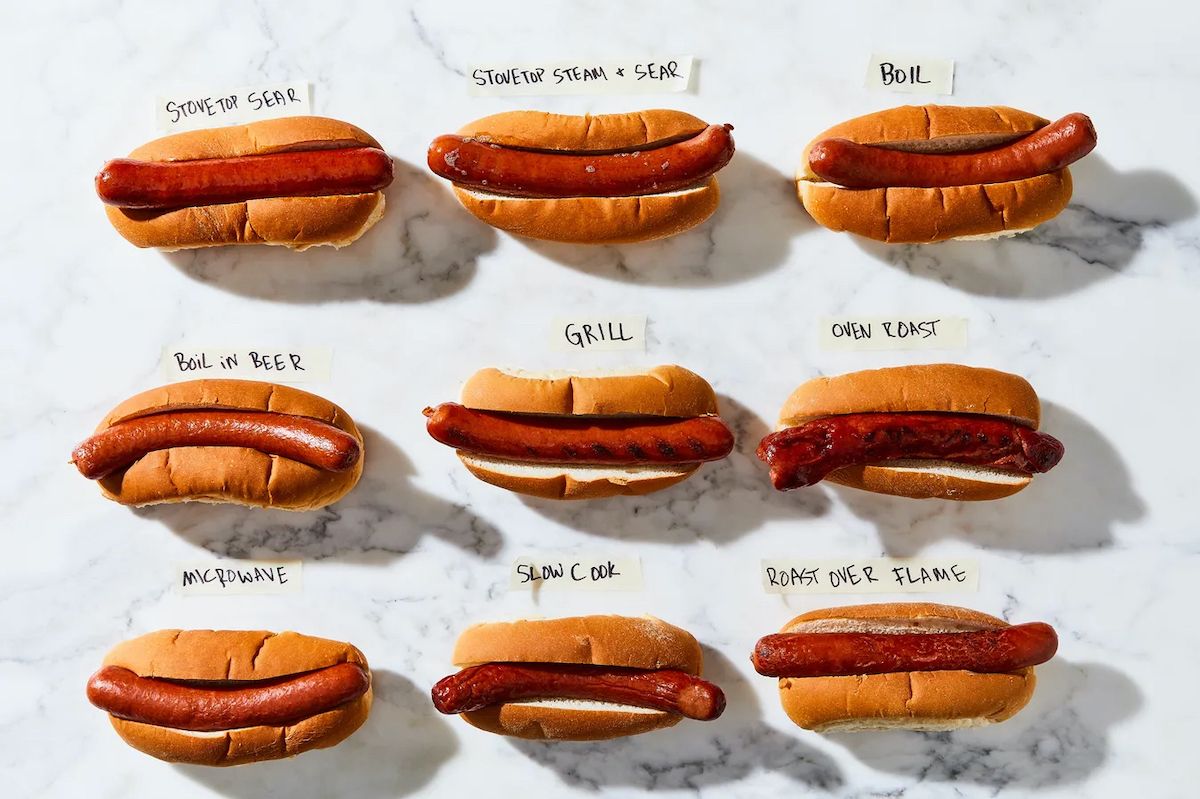In Absolute Best Tests, writer Ella Quittner destroys the sanctity of her home kitchen in the name of truth. She's mashed dozens of potatoes, seared more porterhouse steaks than she cares to recall, and tasted enough types of bacon to concern a cardiologist. Today, she tackles hot dogs.
* * *
One Sunday in February 2014, at Seattle's Fremont Market, six customers spent $169 apiece on a hot dog unlike any other.
The bunned-up sausage, proffered by the now-defunct Seattle food truck Tokyo Dog, holds the Guinness title for World's Most Expensive Hot Dog to this day. According to records, the Juuni Ban was a Bavarian sausage "infused with cheddar" and served on buttered, toasted brioche, topped with seared maitakes, foie gras, Wagyu beef, black truffles, onions, and caviar. (Tokyo Dog's signature offering — the same dog with a more humble garnish — was a paltry $8, by comparison.)
I stumbled upon the hulking Juuni Ban seven years later while researching the best way to cook a hot dog for Absolute Best Tests. While I wasn't able to reach Tokyo Dog's owners, Eugene Woo and Samson Kwong, to talk cook methods, I was able to unearth a 28-minute video from August 2014, in which cheerful host Asha Leo visits the truck for a full procedural run-through.
In the video, the dog-slinging duo notes that they spent three months developing the Juuni Ban, which sometimes spurts melted cheese at its handler. Their cook method was simple but effective: They first warmed the cheddar-suffused specimen in metal containers of hot water—likely to decrease the risk of a cheese explosion — before transferring it to a hot grill, where they rotated it over an open flame until it reached an internal temperature of 160°F.
Though I had no plans to offload my own wares for hundreds of dollars, I took solace in the Tokyo Dog method because it affirmed a hunch: When cooking a hot dog, simplicity is key. No special equipment was employed, no TikTok hacks called in, and still, a dog of great global import was produced. Given that my own trials would be cheddar-free, I figured I could skip the water-warming step, though I did add a dramatic double-underline to "Grill" on my list of methods.
Toward the end of that Tokyo Dog segment, the host lifts the infant-sized frank to her mouth, declaring gleefully, "Oh, the memes that are going to come from this!" After a few moments' consideration, she takes a small bite while the dog's creators chant "chew, chew, chew." Several tense seconds pass as she masticates, before she declares the World's Most Expensive Hot Dog both "incredible" and "amazing."
With that as my benchmark — and after confirming that there was absolutely no one in the vicinity to chant "chew, chew, chew" — I set out to test nine methods of hot dog cookery.
* * *
Controls
I used all-beef hot dogs for every trial. For the sanctity of results, I did initial tasting rounds sans condiments, but I would like the record to show that my preferred toppings are ketchup, yellow mustard, and raw diced onion, and that if you're going to serve me a hot dog on anything but an untoasted Martin's potato bun, you may as well not invite me.
/c292e439-dbbe-4abe-9a5e-b70eec930d24--2021-0504_abt-hot-dogs-sans-buns_3x2_julia-gartland_284.jpg)
Photo by Julia Gartland. Prop stylist: Ali Slagle. Food stylist: Pearl Jones.
* * *
Round One: To slice or not to slice?
The findings
For the juiciest hot dog, do not slice it. This does invite risk, as hot dogs with no vent for steam may explode in specific conditions — but I think it's a risk worth taking. (Especially if, like me, you are cooking hot dogs that contain no molten cheese.)
The No Cut hot dogs produced by my Round One trials were noticeably juicier (and larger, having retained more liquid) than the Spiral-Cut and Slashed hot dogs, with the Slashed hot dogs in second place.
If juiciness is less of a priority than aesthetic appeal, you may consider embracing the Spiral-Cut, which elicited a not-immaterial amount of glee. And if toppings are your greatest priority, turn to the Slashed, which provides a moat for ketchup and mustard to act as glue for tiny chopped toppings like onion, herbs, pickled radish, or crushed potato chips.
The methods
No Cut
- Place a cast-iron skillet over medium-high heat. Add 1 tablespoon of butter.
- Once the butter has foamed and the foam has subsided, add 1 hot dog to the skillet.
- Sear, shifting every minute or so, until plumped and beginning to brown on each side, 3 to 4 minutes.
Slashed
- Place a cast-iron skillet over medium-high heat. Add 1 tablespoon of butter.
- Meanwhile, slice one side of a hot dog lengthwise, about 1/3-inch deep.
- Once the butter has foamed and the foam has subsided, add 1 hot dog to the skillet. Sear, shifting every minute or so, until plumped and beginning to brown on each side, 3 to 4 minutes.
Spiral-Cut
- Place a cast-iron skillet over medium-high heat. Add 1 tablespoon of butter.
- Meanwhile, slice a hot dog crosswise in a spiral pattern, about 1/3-inch deep.
- Once the butter has foamed and the foam has subsided, add 1 hot dog to the skillet. Sear, shifting every minute or so, until plumped and beginning to brown on each side, 3 to 4 minutes.
* * *
Round Two: How to cook a hot dog
The findings
For a well-browned hot dog with notes of campfire, consider the Roast Over Flame or Grill methods. Both produced tender specimens with well-seared casings that carried extra scorchy flavors, beyond the standard salty, meaty ones. (For a well-browned dog with notes only of browned butter, simply Stovetop Sear.)
For the juiciest, most flavorful dog, Boil in Beer, and you'll end up with a plump contender that tastes more like a hot dog than any other hot dog. For an exceptionally juicy dog with muted flavor — for when you'd like condiments to really shine — Boil in Water. Despite the stigma, both methods resulted in plump hot dogs with especially plush interiors, closer in texture to a great Weisswurst than to the rubbery dogs of childhood cafeterias.
For a hot dog that best impersonates one you'd get at a ballpark or from those mesmerizing rotating racks at a convenience store, consider using your Slow Cooker, if you've got 4 hours to spare. (Note: This is apparently similar to the method employed by Nathan's, the morning of their annual hot-dog-eating contest.)
You can skip the Microwave, which yielded an unusually tough casing and caused the hot dog to burst, as well as the Stovetop Steam & Sear, which resulted in less browning on the outside, and an interior that was no juicier than the Stovetop Sear.
The methods
Stovetop Sear
- Place a cast-iron skillet over medium-high heat. Add 1 tablespoon of butter.
- Once the butter has foamed and the foam has subsided, add 1 hot dog to the skillet.
- Sear, shifting every minute or so, until plumped and beginning to brown on each side, 3 to 4 minutes.
Stovetop Steam and Sear
- Add water to a cast-iron skillet until it rises about 1/2 inch up the sides.
- Place the skillet over medium-high heat and cook until the water begins to boil.
- Add 1 hot dog to the pan along with 1 tablespoon of butter. Sear on each side until the water has boiled off and the hot dog is plump and beginning to brown.
Boil
Adapted from Food52.
- Bring a small pot of water to a boil.
- Add 1 hot dog. Boil uncovered for 4 to 6 minutes, until the hot dog has plumped up on all sides.
- Remove with tongs and drain on a paper-towel-lined plate.
Boil in Beer
Adapted from My Gourmet Connection.
- Empty a few cans of beer into a small pot and bring to a boil.
- Add 1 hot dog. Boil uncovered for 4 to 6 minutes, until the hot dog has plumped up on all sides.
- Remove with tongs and drain on a paper-towel-lined plate.
Grill
- Heat the grill to medium-high.
- Add 1 hot dog to the grill, rolling onto a new side every minute or so, until evenly browned and cooked through, 3 to 4 minutes total.
Oven Roast
- Heat the oven to 400°F.
- Place a hot dog in a roasting pan or on a rimmed sheet pan.
- Roast the hot dog for about 15 minutes, until plumped and beginning to brown.
Microwave
- Place a hot dog on a heatproof plate lined with paper towels.
- Microwave on high for 45 seconds to 1 minute, until the center of the hotdog is warm to the touch.
Slow Cook
Adapted from Boulder Locavore.
- Add a hot dog to the slow cooker, leaning upright against the slow cooker's inner wall for support. Do not add water!
- Cook on low setting for 4 hours.
Roast Over Flame
- Thread a metal skewer through a hot dog.
- Hold it over an open flame, such as one of your burners set on high, or a campfire.
- Rotate the hot dog every 30 seconds or so, until browned and cooked through, 2 to 3 minutes total.




Shares